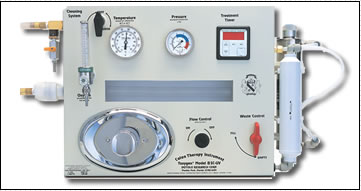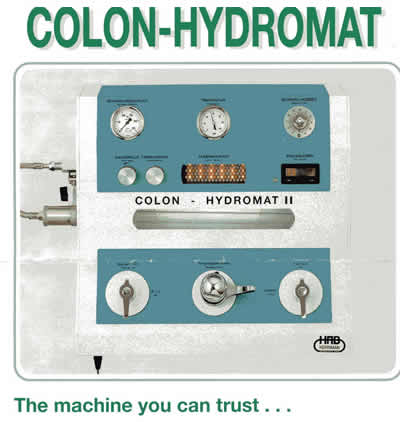What is Colonic Hydrotherapy?
In short it is a bowel cleanse. The bowel is your sewage area or the rubbish
bin of your body where all unwanted material is stored until you eliminate
and like your rubbish bin it is susceptible to a certain amount of stagnation
and the formation of decay and poisonous substances. It therefore needs
special care to keep it clean and free from putrefaction. When this does
not happen the decay is not limited to the site of origin. It spreads rapidly
to other organs, causing a sort of autointoxication or self-poisoning.
The poisoning can take many forms. Tiredness, bad-breath, skin problems, lack of energy, bloated sensations, breathlessness, headaches neuralgia, insomnia, poor memory, constipation, diarrhoea, sinus problems. The list is endless. This may eventually lead to more serious problems such as diverticulitis, colitis, irritable bowel syndrome, liver and kidney problems. Not forgetting the dreaded worms that most people think only happens to their pets.
In 1912 medical orthodoxy took it very seriously. In that year 57 leading British physicians discussed alimentary toxaemia before the Royal Society of Medicine. They listed 36 poisonous substances, several highly active, which had been noted in the colon. These, they concluded, produced the most profound effects even in the smallest quantities.
All this has been largely forgotten. With modern medicine more interested in looking at specialised areas of the body, the focus is on letting the colon get on with it. The human gut remains one of the greatest mysteries to medical science.
Colonic irrigation may sound a far-fetched answer to some of your health problems, but it's really no more than an internal bath helping cleanse the colon of excess gas and accumulated faecal matter. Unlike an enema, it does not involve retention of water and it also reaches further along the bowel. The bowel is approximately five feet in length and two and a half inches in diameter.

What might your doctor say if you asked about colonics?
Conventional medicine dismisses Colonic Hydrotherapy at three levels.
It maintains that 'colonics' are not natural and therefore can not be the
cure-all that supporters claim them to be. Doctors point out that the human
body has its own perfectly adequate means of waste disposal.
Secondly, it argues that colonic irrigation removes the lactobacillus acidophilus bacteria that are essential to proper functioning of the colon. The electrolyte (mineral salt) balance is disturbed through the treatment and minerals are washed away.
The third argument levelled at the colonic irrigation is that a poorly trained practitioner could cause damage to the rectum through an incorrectly inserted scope. There is also concern that maintaining the water at too great a pressure could rupture the bowel.
To summarise, conventional medicine by and large argues that not only are 'colonics' of no benefit to total health, but that they also disrupt the workings of the colon and can even be dangerous.
To answer their first concern; The body has its own natural way of cleansing the bowl.
Why then are so many people taking laxatives?
Chemists will tell you that there is a high turn over of sales for laxatives.
Second concern; 'Colonics' remove health bacteria like Lactobacillus Acidipholus from the colon. - Colonic hydrotherapists will recommends patients to take acidopholus after their treatment. Antibiotics prescribed by doctors also kill Lactobacillus Acidophilus in the gut. Do doctors recommend taking Acidophilus after a course of antibiotics?
Third concern; poorly trained practitioners may cause damage to the rectum. Colonic Hydrotherapy courses are all postgraduate. The student must be either conventionally trained in medicine e.g. doctor or nurse or be a graduate from a recognised body based complementary medicine course (which includes in-depth anatomy and physiology which was of a least two years duration and have a minimum or equivalent of two years full time experience practicing complementary therapy other than Colonic hydrotherapy).
There is no need for concern regarding too much
pressure being used in the bowel. The filtered water flows through
a small tube no bigger than your little finger.
When doctors say there is no need to go to such lengths, nature has it own
way of taking care of the bowel. Yes, you would agree, if we still lived
in the nineteenth century where the majority of people spent a good deal
of their time doing manual work. For example working the fields, down on
your haunches, pulling and lifting, walking running and riding bicycles.
Eating good wholesome food. Eating when hungry, not eating to the clock.
Going to the toilet when nature called, not putting it off until later.
We cannot have a healthy body without clean blood and we cannot have that without a clean bowel with good tone to move waste along and out of the body. By stripping down the old toxic mucus lining of the bowel many diseases can be helped. Colonic Hydrotherapy can be your first step towards normalising the bowel so those friendly bacteria can return to keep the colon safe from further auto-intoxication.
What happens when you make an appointment?
After a full medical history is taken and in the therapist professional
opinion you are eligible for the treatment, the following procedure is followed
in a safe and hygienic environment.
The treatment usually lasts about one hour.
Procedure
Full case history taken and explanation of the procedure.
Remove clothing to waist level, towels are provided for modesty. Patients lie on their left side on a couch. A digital examination of the rectum is necessary, to determine the size of the Anus and the angle of the Rectum, as well as the possibility of haemorrhoids and fissures. In the case of male patients, prostrate size is determined.
If there are no complications, a disposable speculum is inserted into the rectum. Two disposable hoses are then attached to it, one for the incoming filtered water, the other for the elimination of faecal waste matter, which goes into the sewer. It may be necessary after a period of time for you to turn and lie on your back so that the therapist can give a gentle abdominal massage to help with stubborn faeces. (not all therapists use disposable equipment)
How long does the treatment take?
A treatment usually lasts approximately one hour.
 How
many treatments will I need?
How
many treatments will I need?
Frequency of treatments is as difficult as the proverbial ‘how long
is a piece of string?’ each person differs in both their needs and
responses, however, it is usual to embark on a course of six to eight treatments
to begin with, and wise to have the first four close together (weekly).
Vulcanised bowel contents will take time to shift and it may take several
treatments to start the process off. If the treatments are close together
the colon does not have time to revert to its former state. There is the
possibility that you may have to take a combination of herbs to facilitate
the treatments; these are taken in between treatments. There is also the
possibility that herbal or coffee enema may be necessary during a treatment
or acidopholus maybe implanted. Your therapist will discuss everything with
you.
What is the difference between an enema and Colonic
irrigation?
In the case of self-administered enema, water is retained for a period of
time and only reaches part of the descending colon and sigmoid colon. You
then have to evacuate on the toilet. With Colonic Hydrotherapy there is
a constant flow of water along the length of the colon, with no smell as
the waste goes into the sewer. (closed system)
Will there be any pain?
The treatment is remarkably free of any real discomfort though some abdominal
cramps are to be expected when evacuating strongly which happens from time
to time. Sometimes the influence of the water can cause gurgling as can
the presence of trapped gas.
Will I get home without leaking?
In my experience this has not been the case, if you are worried, a pad is
available for your peace of mind.
How much does it cost?
Each session costs £80, which includes disposable equipment.
Home | About Colonics | About Clare Davies | Courses | Contact | Links

